Is it Dangerous if the Pilot Light Goes Out on the Water Heater?
Author: Omar Alonso | Editor: Omar Alonso
Review & Research: Jen Worst & Chris Miller

Have you ever experienced the shock of an unexpected cold shower and wondered, "Is it dangerous if the pilot light goes out on the water heater?" If so, we’ve got all the answers.
Here we'll explore the function and importance of your water heater's pilot light, potential risks that may arise when it goes out, and what steps to take if it happens in your home. Understanding these aspects will help ensure safety and comfort in your daily life.
Understanding Pilot Lights on Water Heaters
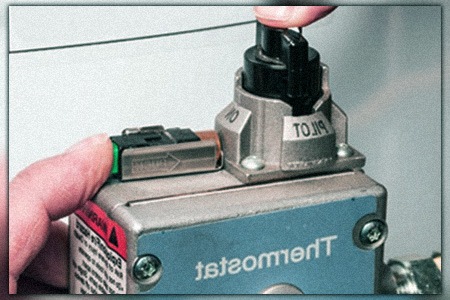
The pilot light is a crucial component of gas water heaters since it ignites the burners that provide hot water, and its function is to keep the gas flowing.
Definition & Function
Understanding the function and definition of pilot lights on gas types of water heaters is essential for maintaining a safe and efficient home. The pilot light is a small, continuous flame that ignites the gas from the main burner when your water heater needs to heat up.
Common Causes of Pilot Light Failure
Pilot light failure in water heaters can be attributed to several factors. One common cause is an unclean pilot tube, which may accumulate dirt and debris over time, obstructing the gas flow and ultimately causing the pilot light to go out.
Another frequent culprit behind pilot light issues is a dirty or kinked thermocouple. The thermocouple is a safety device that senses when the pilot flame is lit, allowing gas to flow into the combustion chamber.
If it becomes dirty or bent, it may fail to detect the flame and shut off the gas supply prematurely, causing the pilot light to go out. Additionally, faulty or weak gas regulators might lead to inconsistent gas pressure affecting multiple appliances – including your water heater's pilot light performance.
In direct vent gas water heaters specifically, the insufficient air supply is one of the most common causes of extinguished pilots. Ensuring adequate ventilation around your water heater and regularly checking for any blockages in air passages can help prevent such problems from arising in the first place.
All of these problems are all easily fixable and maintainable through professional water heater repair, which is cheaper than rushing out to buy a new one. It's faster than trying to diagnose the problem yourself and then hunt down parts, drain the tank, install the parts, and hope you did it right as you refill it.
Risks Associated With a Pilot Light Going Out
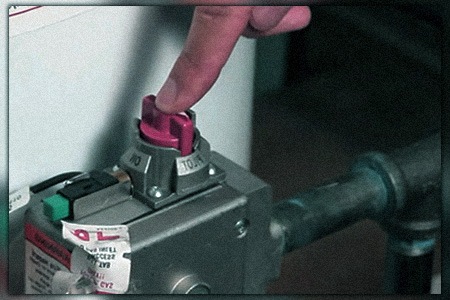
Is it dangerous if the pilot light goes out on the water heater? When the pilot light goes out, there are a few risks that homeowners need to be aware of, including gas leaks, carbon monoxide poisoning, fire hazards, and drafts or strong gusts of wind.
Gas Leaks
If the pilot light goes out on a water heater does gas leak? Yes, gas leaks are among the most significant risks associated with a pilot light going out on a water heater. While gas shutoff occurs when the pilot light goes out, if the gas line continues to flow after that, it can lead to dangerous situations.
Gas leaks occur when there is prolonged leaking of gas into the air without ignition, which can increase the risk of fire or explosion in your home. In such scenarios, a common cause of gas leaks is negligence in monitoring and diagnosing issues with water heaters or other heating appliances connected to your propane or natural gas supply.
Homeowners must take necessary steps to prevent potential hazards due to their water heater system. Regularly checking for clogged tubes and malfunctioning thermocouples is mandatory for safety, as they often contribute directly to pilot light malfunctions that could start dangerous scenarios.
Carbon Monoxide Poisoning
Carbon monoxide poisoning is one of the most dangerous risks associated with a pilot light going out on your water heater. Exposure to carbon monoxide can lead to serious health problems, including headaches, nausea, dizziness, and even death in severe cases.
This deadly gas is odorless and colorless, so it's essential to have a reliable carbon monoxide detector installed in your home. A faulty or improperly vented gas appliance like a water heater can produce carbon monoxide fumes that pose a significant risk of accidental poisoning.
In addition to having carbon monoxide detectors installed in your home, regular maintenance checks for ventilation systems and gas appliances can help prevent the potential risks associated with pilot light failure.
Fire Hazards
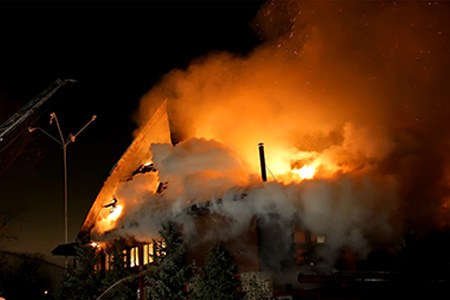
A fire hazard is one of the most severe risks of a pilot light going out on a water heater. If there are any combustible materials, such as paper, cleaning products, or even dust particles, in the vicinity of your water heater and its pilot light, they can ignite if exposed to the flame.
Moreover, a strong gust of wind could also blow out the pilot light, causing gas to accumulate until an ignition source is present. That’s why ensure your water heater's pilot lid is always shut.
To prevent fire hazards associated with your water heater's pilot light going out, ensure that no flammable substances are stored too close to it or in enclosed spaces with gas appliances.
Additionally, you should check for drafts or strong winds around your water heater and avoid lighting it on windy days when possible.
Drafts or Strong Gusts of Wind
Drafts or strong gusts of wind can cause the pilot light on your water heater to go out, which may lead to numerous dangers. A draft in the house could come from the chimney and blow out the pilot light, making it essential to address any draft prevention measures.
Besides preventing drafts, misaligned pilot lights and faulty thermocouples are often behind a frequently going off the pilot light. To protect yourself from any potential risks associated with a malfunctioning water heater's pilot lights, promptly clean or replace damaged parts.
So always be careful when using gas appliance systems because they pose inherent hazards if not properly installed or maintained. Is it dangerous if the pilot light goes out on the water heater? Yes, to a degree, if you don't act on it fairly quickly.
What to Do if Your Pilot Light Goes Out
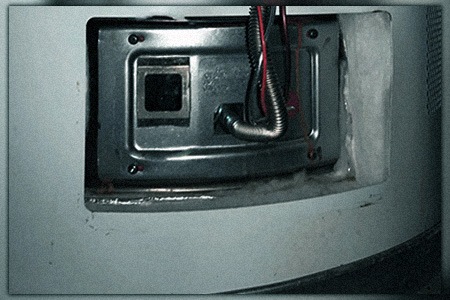
If your pilot light goes out (make sure this is the case and it's not a case of the hot water heater not filling up), follow these safety precautions before attempting to relight it: turn off the gas valve control, close all gas appliance shut-off valves, and open windows and doors for ventilation.
Relighting the pilot light can be done in five simple steps, but call a professional if you're unsure or uncomfortable with the process.
Safety Precautions
Ensuring your safety is the utmost priority when dealing with a pilot light that has gone out. Before attempting to relight the pilot, turn off the gas supply valve and wait for at least ten minutes for any remaining gas to dissipate.
Avoid using matches or lighters near gas leaks, and carbon monoxide detectors should be installed as an added measure of protection. It's important to maintain your water heater regularly, such as cleaning it thoroughly and ensuring proper ventilation in the room where it is located.
If you are unsure how to relight the pilot safely or if there are any other issues with your water heater, don't hesitate to call a professional for assistance.
Relighting the Pilot Light
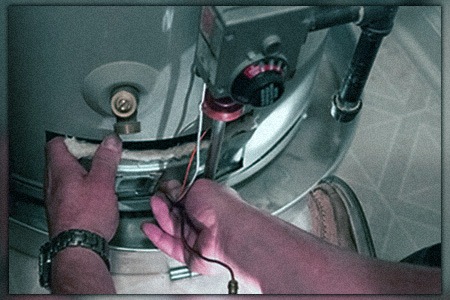
If your water heater pilot goes out, you'll want to get it lit again soon. Relighting the pilot light on your water heater is a task you can perform if it goes out. Before starting, ensure that all safety precautions are taken to avoid potential hazards.
To relight the pilot light, locate the ignition system and associated controls. Typically, these are found near the bottom of your water heater behind an access panel.
Once you have located the pilot light orifice, turn its knob to the "pilot" position while pressing the reset button or control valve down. While holding down this button or valve, use a long match or lighter to ignite the pilot flame through the opening of this component.
If you encounter difficulties relighting your pilot light, there could be other underlying issues, such as an extinguished thermocouple or faulty ignition system requiring professional help from a licensed plumber or HVAC technician familiar with water heating systems.
When to Call a Professional
While relighting a pilot light on your water heater may seem simple, sometimes it's best to call a professional. You should consider calling an expert if you experience frequent pilot light outages or if the appliance won't stay lit.
Additionally, if there is any indication of gas leaks or carbon monoxide poisoning, such as a strong odor or feeling dizzy and lightheaded, evacuate immediately and contact emergency services.
A professional can also help troubleshoot issues with the gas regulator, valve, and thermocouple that may be causing recurring problems. If they determine you need a new one entirely, installing a water heater doesn't take too long.
Remember that dealing with gas appliances can be dangerous, so it's always better to err on the side of caution when in doubt about handling them safely.
If you are unsure whether to call for help or attempt to fix the problem, refer back to our troubleshooting tips from the outline above first.
Troubleshooting Tips
If your pilot light goes out on your gas water heater, the first step you should take is to make sure that the gas shut-off valve is turned off to avoid any potential leaks.
Once that's done, try cleaning or replacing the thermocouple since it's one of the most common causes of pilot light failure.
To relight your pilot light, depress and hold down on the control knob for at least 30 seconds before igniting a long match or wand lighter. Be careful not to use anything flammable near the heater, as this may cause an explosion.
So, Is it Dangerous if the Pilot Light Goes Out on the Water Heater?
In conclusion, while the pilot light going out on a water heater is not inherently dangerous, it can lead to several risks, such as gas leaks, fire hazards, and carbon monoxide poisoning.
Taking proper safety precautions when relighting the pilot light or calling in a professional if needed is crucial. With regular water heater maintenance and attention to potential issues with the pilot light, you can ensure that your home appliances operate safely and effectively for years to come. Is it dangerous if the pilot light goes out on the water heater? It can lead to danger, so please take care of it immediately.



